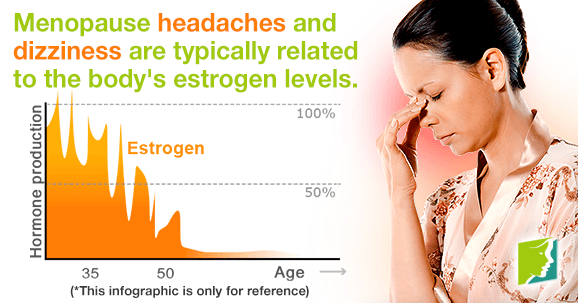Quick Fact:
Dizziness can be directly caused by menopause, or indirectly caused by medications you're taking.
Headaches and dizziness are a common but little known symptom of menopause. While dizziness usually passes and headaches can be relieved with aspirin, intense forms of either symptom can be disturbing. Dizziness can be directly or indirectly related to the changes associated with menopause. Therefore, the causes of dizziness might be connected to the changes in the body or result from medication being taken for other menopause symptoms. Treating menopausal headaches and dizziness can be tricky, but doable and worth it.
Why Do I Experience Menopause Headaches and Dizziness?
Menopause headaches and dizziness are typically related to the body's estrogen levels. The lower the level of estrogen, the worse the menopause headaches tend to be. Fluctuating hormones can also produce dizziness spells, which means headaches and dizziness can be quite common during menopause. The role of estrogen in headaches also explains why some women experience headaches in the days leading up to their periods, or during the middle of the menstrual cycle when a woman is ovulating.
What Other Factors Can Provoke Headaches and Dizziness?
Quick Fact:
Dizziness is often seen as mere frustrating rather than a life threatening problem. However, sudden dizziness while driving could easily cause an accident.
Every woman will experience headaches and dizziness differently. However, women who experience headaches during their normal menstrual periods tend to experience them during menopause as well. Factors such as noise, light, and stress can also provoke both headaches and dizziness.
Dizziness can occur when there are changes in the blood vessels caused by reduction of estrogen levels. If this is the case, the sufferer will probably also experience hot flashes and night sweats.
What Can I Do about Menopause Headaches and Dizziness?
Quick Fact:
Women experiencing dramatic hormone fluctuations can suffer from panic attacks, which often include dizziness. Some anti-anxiety or anti-migraine medications, however, can worsen dizziness.
There are many options to minimize or even avoid their occurrence. The first step involves isolating the triggers of headaches and dizziness (this could be anything from stress to a certain type of food) and trying to reduce or eliminate these.
The importance of a healthy diet and exercise regime cannot be underestimated in regulating hormone levels. Regulating these levels is important as their imbalance is often what leads to headaches and dizziness during menopause.
Some important things to do to help prevent or alleviate headaches and dizziness are:
Eat healthily, but also to eat regularly.
Include soy in your diet, which contains phytoestrogens and can help to restore estrogen your body is losing naturally.
Try alternative medicines to help stabilize hormone levels naturally and thus reduce the incidence of headaches and dizziness.
More Information
If you are concerned about your symptoms, always go to a doctor. Click here to learn more about menopause headaches and dizziness.
Sources
- U.S. Department of Health and Human Service.(n.d)."Migraines". Retrieved from Department of Health and Human Services.
- Dr. Lichten, Edward. "Menopausal migraine: The Role of Hormonal Replacement." The Menopausal Syndrome. Scottsdale, Arizona January 27, 1990. Reid-Rowell, Inc. Pages 21-24
- Mayo Clinic.(n.d)."Migraines.Retrieved from www.mayoclinic.com.




